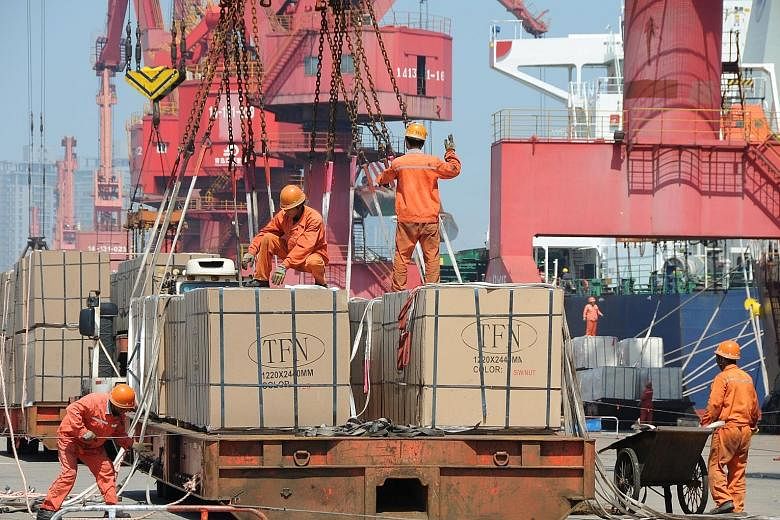In a full-blown trade war, where tariffs were to go back to levels that existed before the multilateral trading system was created, global trade would plummet 17 per cent - more than it fell during the Great Recession of the late 2000s.
Mr Keith Rockwell, director for information and external relations at the World Trade Organisation (WTO), told a three-day workshop for regional parliamentarians yesterday that this was the dip its economists had estimated, with trade-restrictive measures on the rise.
While such measures are applied regularly, they have not been of the magnitude put in place recently.
"Between October 2017 and October 2018, measures were put in place affecting US$588 billion (S$803 billion) worth of trade," said Mr Rockwell, at the event organised by the S. Rajaratnam School of International Studies (RSIS) and the WTO.
This is seven times more than in the previous year and does not include many measures that have been applied recently, he added.
The WTO defines trade-restrictive measures as new or increased tariffs, Customs procedures, quantitative restrictions and local content measures.
Mr Rockwell added, during a discussion about international trade and the current trade tensions, that the WTO has seen 24 dispute settlement cases last year specifically related to the ongoing trade war between the United States and China - on issues such as intellectual property, solar panels, and steel and aluminium.
This comes as the US and China have been imposing tit-for-tat tariffs on each other, with Washington most recently threatening to slap tariffs on another US$325 billion worth of Chinese imports.
These tensions and tariffs have caused the International Monetary Fund to trim its global growth forecast from 3.7 per cent to 3.5 per cent, with the US-China trade conflict alone enough to knock 0.3 percentage points off the global gross domestic product (GDP) in 2020, said Mr Rockwell.
"If the two sides carry through with their threats to wipe out all bilateral trade via prohibitive tariffs, this could have the impact of knocking off even more," he added.
Much of this impact is due to the loss of business confidence and the market's reaction.
Noting that global imports of capital goods fell by 3 per cent in the first quarter, Mr Rockwell said this is the lowest level seen in over three years and a good indicator that businesses are not gearing up. "We see uncertainty rampant, we see manufacturing output stalling, and export orders are down. All of this bodes ill for economic growth," he said.
Some countries may see short-term gains from a re-routing of supply chains, but if the trade war spreads to cars, which make up 8 per cent of global trade, the knock-on effect would be significant and hard to fully determine.
Also speaking at the RSIS-WTO Parliamentarian Workshop at Pan Pacific Singapore was WTO director-general Roberto Azevedo, who flagged the importance of regional MPs working together in these challenging times. While trade growth stood at 4.6 per cent in 2017, it fell to 3 per cent last year. The final quarter of last year also saw the biggest drop in a decade, he said.
"When levels of uncertainty are so high, trade simply cannot play its full role in driving GDP growth," he added. "We're working to respond to the challenges in global trade today... We're also working to support our members in their efforts to reform the WTO."
At the event yesterday, Associate Professor Henry Gao of Singapore Management University cautioned against focusing on China in reform proposals as the US, Europe and Canada have done. He said there is a risk that when China becomes the biggest power, it too will try to tailor rules to target its main competitors.
But countries must continue updating the multilateral trading system, said Speaker of Parliament Tan Chuan-Jin. This comes as new frontiers such as trade in services continue to grow, and economies increasingly transition to digital ones.
He added that given the interdependence of economies now, abuse and neglect of the multilateral trading system will benefit few.
Ambassador Ong Keng Yong, executive deputy chairman of RSIS, said trade has helped South-east Asia to consolidate its position globally. "Our Asean member states will continue to promote trade, strengthen the existing trade agreements we have and look for new ones."


